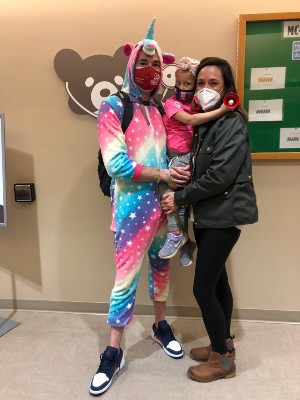
Isabel's Story

Isabel's parents knew something wasn’t right when their 4-year-old daughter, who they affectionately call “Boom Boom,” seemed to have uncharacteristically low energy during her grandparents’ 50th-anniversary party in Tennessee. “Pretty much the entire time, Isabel just didn’t want to participate in activities,” said her father Steven. “We knew something was off.”
Concerned, Isabel’s mother Daniela took her to urgent care. “They felt around her organs and they were enlarged. They did a blood test and found out that her white [blood] cells were elevated,” Steven said. “They told my wife to go directly to Children’s National Hospital.”
Because of COVID-19, only one parent was allowed to accompany Isabel into the emergency room when they arrived. So while his wife stayed with Isabel at the hospital, Steven drove home to get Isabel’s favorite toy, a Rapunzel doll. While on the road, his wife called him to say that doctors had pulled her into a private room to share some bad news. “That was when we found out she had some form of cancer,” Steven said. The diagnosis was a shock. “You don’t ever think about the possibility that your child has cancer,” he said.
An Unexpected, Long Journey Ahead

Isabel was admitted to Children’s National, where she underwent a bone marrow biopsy, said Shana Jacobs, M.D., Isabel’s oncologist at Children’s National. At first, it was difficult to pinpoint what type of cancer Isabel had. After a number of diagnostic tests, Isabel’s official diagnosis was Burkitt lymphoma, a rare and extremely aggressive form of non-Hodgkin lymphoma. “It's probably one of the fastest growing kinds of cancer that exists,” said Dr. Jacobs. The good news was that Burkitt lymphoma responds incredibly well to chemotherapy, as long as intensive treatment is started promptly.
Isabel ended up having six cycles of chemotherapy over a six-month period. “Patients are in the hospital for almost the entire time getting lots of different medicines in addition to needing lots of blood products, antibiotics and other kinds of supportive care,” Dr. Jacobs explained. Isabel also had to have 13 spinal taps to detect if cancer cells had gotten into her spinal fluid.
“We were in the hospital about 80 percent of the time during those six months,” Steven said.
It’s common for children undergoing this kind of aggressive chemotherapy to end up being admitted to the hospital for fevers and other complications between cycles of chemotherapy. “She needed lots and lots of blood and platelet transfusions,” Dr. Jacobs said. Isabel was also treated for mucositis, a common and painful side effect of chemotherapy, in which your mouth and gut can become inflamed, making it hard to eat. In conjunction with chemotherapy drugs, Isabel also received rituximab, a targeted medication which has been proven to improve cancer cure rates for this type of lymphoma.

